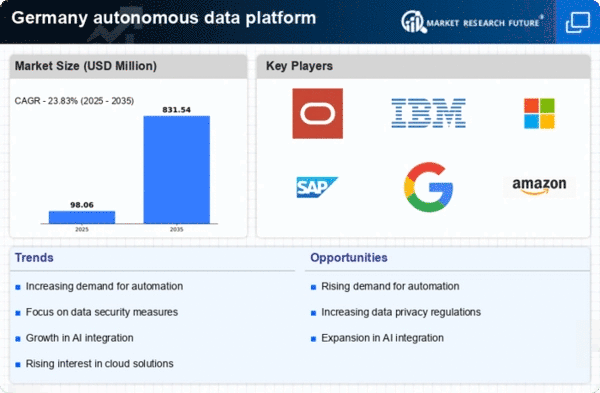Integration of IoT Devices
The proliferation of Internet of Things (IoT) devices in Germany is a critical driver for the autonomous data-platform market. As more devices become interconnected, the volume of data generated increases exponentially, necessitating advanced platforms capable of managing and analyzing this data efficiently. The autonomous data-platform market is poised to benefit from this trend, as organizations seek solutions that can handle vast amounts of data from diverse sources. It is estimated that by 2026, the number of connected IoT devices in Germany will exceed 1 billion, further emphasizing the need for robust data management solutions. This integration not only enhances operational capabilities but also enables predictive analytics, which is essential for businesses aiming to stay competitive in a rapidly evolving landscape.
Rising Demand for Real-Time Analytics
The autonomous data-platform market experiences a notable surge in demand for real-time analytics solutions. Businesses in Germany increasingly require immediate insights to make informed decisions, driving the need for platforms that can process and analyze data instantaneously. This trend is particularly evident in sectors such as finance and retail, where timely data can significantly impact operational efficiency and customer satisfaction. According to recent studies, the market for real-time analytics is projected to grow at a CAGR of approximately 25% over the next five years. This growth indicates a robust appetite for autonomous data platforms that can seamlessly integrate with existing systems and provide actionable insights without human intervention, thereby enhancing overall productivity in the autonomous data-platform market.
Emphasis on Data-Driven Decision Making
In Germany, there is a growing emphasis on data-driven decision making across various industries, which significantly influences the autonomous data-platform market. Organizations are increasingly recognizing the value of leveraging data to inform strategic choices, leading to a heightened demand for platforms that facilitate data collection, analysis, and visualization. This shift is particularly pronounced in sectors such as manufacturing and healthcare, where data insights can lead to improved efficiency and better outcomes. Reports indicate that companies utilizing data-driven strategies are 5 times more likely to make faster decisions than their competitors. Consequently, the autonomous data-platform market is likely to expand as businesses invest in technologies that support this paradigm shift, ensuring they remain agile and responsive to market changes.
Regulatory Compliance and Data Governance
the autonomous data-platform market in Germany is heavily influenced by regulatory compliance and data governance.. With stringent regulations such as the General Data Protection Regulation (GDPR) in place, organizations are compelled to adopt data management solutions that ensure compliance while maintaining data integrity. This regulatory landscape drives the demand for autonomous data platforms that can automate compliance processes and provide robust data governance frameworks. It is estimated that non-compliance can result in fines of up to €20 million or 4% of annual global turnover, which underscores the importance of investing in compliant data solutions. As businesses navigate these complexities, the autonomous data-platform market is expected to grow, offering tools that help organizations manage their data responsibly and effectively.
Advancements in Machine Learning Algorithms
Advancements in machine learning algorithms are playing a pivotal role in shaping the autonomous data-platform market. In Germany, organizations are increasingly adopting these sophisticated algorithms to enhance data processing capabilities and improve predictive analytics. The integration of machine learning into autonomous data platforms allows for more accurate data interpretation and the ability to uncover hidden patterns within large datasets. This trend is expected to drive market growth, as companies seek to leverage machine learning for competitive advantage. Research indicates that the machine learning market is projected to reach €8 billion by 2027 in Germany, highlighting the potential for autonomous data platforms to capitalize on these advancements. As businesses continue to explore innovative ways to utilize data, the demand for platforms that incorporate cutting-edge machine learning technologies is likely to rise.
















